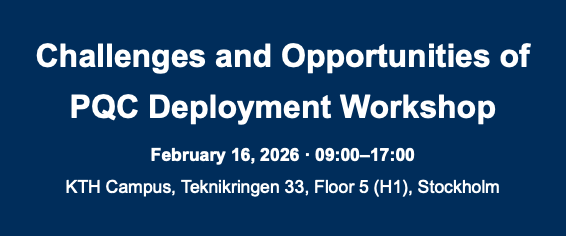Date and time: 17 January 2022, 08:50 – 17:00 CET
Title: Machine Learning day
Where: online via Zoom
Zoom-link to MAIN STAGE: https://kth-se.zoom.us/j/62535529876
Meeting ID: 625 3552 9876
Register for the event HERE.
PLEASE NOTE – DUE TO THE PANDEMIC SITUATION THE EVENT WILL BE FULLY DIGITAL!
The main objective behind this event is to map the rich landscape of machine learning research at KTH, Stockholm University and RISE, and inform each other about collaborative opportunities. For that purpose, we would like to invite Digital Futures faculty, their colleagues, industrial and societal partners, postdocs, and PhD students who want to share their machine learning research interests and network.
Both morning and afternoon poster sessions are divided into three parallel groups. Each group has its own Zoom room dedicated and is composed of 5-7 poster presentations, which are held one after another. The average time for each poster is around 7-8 mins and we expect a lot of informal discussions to take place. For each poster group, there is a moderator assigned to facilitate more focused discussions in dedicated break-out rooms (created on a spontaneous request). It is expected that posters will be presented either in the form of a few slides or a single pdf shared in the respective Zoom room with the accompanying live commentary by the authors in the background.
PROGRAM
Zoom-link to MAIN STAGE: https://kth-se.zoom.us/j/62535529876
08:50 – 09:00 Welcome and introduction
Aristides Gionis, Pawel Herman, Alexandre Proutiere and Karl H Johansson, Director Digital Futures
09:00 – 10:00 KEYNOTE: Professor Mikael Johansson, Decision and Control Systems, KTH
Addressing the algorithmic bottlenecks to large-scale learning: asynchrony, communication-efficiency and adaptivity
Abstract: Machine learning problems are rapidly expanding in size and scope. Increasingly often, we face problems where data, computations, and decisions need to be distributed on multiple nodes. These nodes may be individual cores in a CPU, different processing units in a multi-processor platform, or devices in a federated learning system. In these systems, training times are no longer limited by our access to raw processing power. Instead, they are bound by data transfer times and hampered by a lack of understanding of how to design and tune asynchronous optimization algorithms. In this talk, I will describe a few recent results that allow relieving such bottlenecks.
First, I will present novel convergence results for asynchronous iterations that appear in the analysis of parallel and distributed optimisation algorithms. The results are simple to apply and give explicit estimates for how the degree of asynchrony impacts the convergence rates of the iterates. Our results shorten, streamline and strengthen existing convergence proofs for several asynchronous optimization methods, and allow us to establish convergence guarantees for popular methods that were thus far lacking a complete theoretical understanding.
Next, I will describe our efforts to develop communication-efficient optimization algorithms. I will review techniques for gradient compression and quantify how the degree of compression affects the accuracy of the optimization process. I will then demonstrate how to compensate for the errors introduced by the gradient compression, leading to higher accuracy guarantees at the same low level of communications.
Finally, I will describe a framework for resource-adaptive algorithms that adjusts the amount of gradient compression online, maximizing the expected optimization progress per communicated bit. Experimental deployments demonstrate communication savings of several orders of magnitude compared to the state-of-the-art gradient compression strategies.
10:00 – 10:15 Coffee break
10:15 – 11:15 Short 5-minutes presentations
| Time | Presenter | Presentation title |
| 10:15-10:20 | Tony Lindeberg | Covariant and invariant deep networks |
| 10:20-10:25 | Hossein Azizpour | Beyond Standard Deep Learning |
| 10:25-10:30 | Borja Rodriguez Galvez & Mikael Skoglund | Information-theoretic bounds on the learning generalization error |
| 10:30-10:35 | Florian Pokorny | Machine Learning & Robotic Manipulation at Scale |
| 10:35-10:40 | Guangyi Zhang & Aristides Gionis | A family of decision-tree algorithms with complexity guarantees |
| 10:40-10:45 | Tobias Oechtering | On privacy-preserving learning PATE |
| 10:45-10:50 | Martin Monperrus | Machine Learning for Automated Program Repair |
| 10:50-10:55 | Raksha Ramakrishna & Gyorgy Dan | Property inference attacks against neural network models |
| 10:55-11:00 | Kim Hammar & Rolf Stadler | Intrusion Prevention through Optimal Stopping |
| 11:00-11:05 | Henrik Boström | Reliable machine learning |
| 11:05-11:10 | David Broman | Probabilistic Programming: Expressive Probabilistic Modeling with Efficient Bayesian Inference |
| 11:10-11:15 | Martina Scolamiero | Topological data analysis |
11:15 – 12:15 Poster session (moderators in bold)
Group 1: Zoom https://kth-se.zoom.us/s/65705796617 Meeting ID: 657 0579 6617
| Group 1Foundations, Security | Borja Rodriguez Galvez & Mikael Skoglund | Information-theoretic bounds on the learning generalization error |
| Heng Fang & Hossein Azizpour | Multi-temporal Consistency Regularization for Change Detection | |
| Federico Baldassarre & Hossein Azizpour | DeepFake Detection Explanations | |
| Tobias Oechtering | On privacy-preserving learning PATE | |
| Mojtaba Eshghie, Cyrille Artho & Dilian Gurov | Dynamic Vulnerability Detection on Smart Contracts Using Machine Learning | |
Group 2: Zoom: https://kth-se.zoom.us/s/69389689999 Meeting ID: 693 8968 9999
| Group 2Applications | Lissy Pellaco & Joakim Jalden | Deep Unfolding for Wireless Communications |
| Xuechun Xu & Joakim Jalden | Model Supported Deep Learning for Nanopore DNA Sequencing | |
| Mojtaba Eshghie, Cyrille Artho & Dilian Gurov | Dynamic Vulnerability Detection on Smart Contracts Using Machine Learning | |
| Tiziana Fuoco, Kateryna Morozovska & Federica Bragone | Physics Informed NNs for modelling temperature and loss distribution in power transformers | |
| Christian Pek & Jana Tumova | Data-driven safe set approximation | |
Group 3: Zoom: https://kth-se.zoom.us/s/64244247263 Meeting ID: 642 4424 7263
| Group 3Learning to Control | John S. Baras | The One Learning Algorithm Hypothesis: Towards a Proof |
| John S. Baras | Risk Sensitive Reinforcement Learning | |
| Rijad Alisic & Karl H Johansson | Learning Covert and Zero-Dynamics Data-Injection Attacks on Cyber-Physical Systems | |
| Yu Xing & Karl H Johansson | Learning Linear Systems with Multiplicative Noise from Multiple Trajectory Data | |
| Yassir Jedra | Learning and Controlling Dynamical Systems with Guarantees | |
| Po-An Wang | Frank Wolfe based algorithms in bandit problems |
12:15 – 13:15 Lunch
Zoom-link to MAIN STAGE: https://kth-se.zoom.us/j/62535529876
13:15 – 14:15 KEYNOTE: Dr Mounia Lalmas-Roelleke, Head of Tech Research @ Personalization at Spotify
Personalizing and diversifying the listening experience
Abstract: The aim of the Personalization mission at Spotify is to “connect listeners and creators in a unique and enriching way”. In this talk, Mounia will describe some of the (research) work to achieve this, from using machine learning to understanding listening diversity.
Bio: Mounia Lalmas-Roelleke is a Director of Research at Spotify, and the Head of Tech Research in Personalisation, where she leads an interdisciplinary team of research scientists, working on personalization and discovery. Mounia also holds an honorary professorship at University College London. In January 2022, she took an additional appointment as a Distinguished Research Fellow at the University of Amsterdam. Before that, she was a Director of Research at Yahoo, where she led a team of researchers working on advertising quality. She also worked with various teams at Yahoo on topics related to user engagement in the context of news, search, and user-generated content. Prior to this, she held a Microsoft Research/RAEng Research Chair at the School of Computing Science, University of Glasgow. Before that, she was Professor of Information Retrieval at the Department of Computer Science at Queen Mary, University of London.
14:15 – 15:30 Short 5-minutes presentations
| Time | Presenter | Presentation title |
| 14:15-14:20 | Pawel Herman | Brain-like perspective on AI and ML |
| 14:20-14:25 | Jörg Conradt | Spiking Neuronal Networks for Real-Time Systems |
| 14:25-14:30 | Jan Kronkqvist | Analyzing DNNs by mixed-integer optimization |
| 14:30-14:35 | Miguel Campos Pinto Coelho de Aguiar & Karl H Johansson | Physics-informed learning for identification and state estimation in traffic applications |
| 14:35-14:40 | Carlo Fischione | Machine Learning over Wireless Networks |
| 14:40-14:45 | Liane Colonna | Introduction to visuAAL (Privacy-Aware and Acceptable Video-Based Technologies and Services for Active and Assisted Living) |
| 14:45-14:50 | Filip Cornell & Sarunas Girdzijauskas | Representing graphs using Random Indexing |
| 14:50-14:55 | Karl Meinke, Arvind Nair & Rachael Sugars | Graph Learning: from autonomous vehicles to digital pathology |
| 14:55-15:00 | Oskar Kviman & Jens Lagergren | Ensembles of variational approximations |
| 15:00-15:05 | Ricardo Vinuesa | Towards a more sustainable aviation through computer simulations and artificial intelligence |
| 15:05-15:10 | Martin Jacobsson | Deep Learning-Based Early Prediction of Intraoperative Hypotension |
| 15:10-15:15 | Emrah Karakaya & Mats Engwall | AI and Industrial transformation |
| 15:15-15:20 | Qianwen Xu | AI for sustainable power systems |
| 15:20-15:25 | Bob Sturm | MUSAiC: Music at the Frontiers of Artificial Creativity and Criticism |
| 15:25-15:30 | Zahra Kalantari | Development of novel hybridized models for urban flood susceptibility mapping |
15:30 – 15:45 Coffee break
16:10 – 16:55 Poster session (moderators in bold)
Group 4: Zoom https://kth-se.zoom.us/s/66667386245 Meeting ID: 666 6738 6245
| Group 4Learning in Networks | Filip Cornell & Sarunas Girdzijauskas | Representing graphs using Random Indexing |
| Karl Meinke, Arvind Nair & Rachael Sugars | Graph Learning of Tissue Models for Digital Pathology | |
| Ruochun Tzeng & Aristides Gionis | Discovering conflicting groups in signed networks | |
| Sijing Tu & Stefan Neumann | A viral marketing-based model for opinion dynamics in online social networks | |
| Lodovico Giaretta & Sarunas Girdzijauskas | Machine Learning on Decentralized Networks | |
| Ahmed Emad & Sarunas Girdzijauskas | Machine Learning on Heterogeneous Networks |
Group 5: Zoom https://kth-se.zoom.us/s/63973014901 Meeting ID: 639 7301 4901
| Group 5Applications | Xiaoxuan Wang & Rolf Stadler | Online feature selection for efficient learning in networked systems |
| Stefano Markidis | Automatic Data Exploration and Analysis of Space Physics Data | |
| Asta Kizyte & Ruoli Wang | Robust Ankle Torque Estimation Using Electromyography and Long Short-Term Memory Network | |
| Jörg Conradt | Spiking Neuronal Networks for Real-Time Systems | |
| Giovanni Calzolari | Deep learning to aid CFD simulations in Built environment | |
| Naresh Balaji Ravichandran & Pawel Herman | Unsupervised representations learning in brain-like networks with Hebbian-like plasticity | |
| Erik Fransén | Machine learning-based unsupervised feature extraction from magnetoencephalography and eye-tracking data |
Group 6: Zoom https://kth-se.zoom.us/s/61823009421 Meeting ID: 618 2300 9421
| Group 6Applications | Martin Isaksson & Sarunas Girdzijauskas | Adaptive Expert Models for Federated Learning |
| Debaditya Roy & Sarunas Girdzijauskas | Confidence Calibrated Human Activity Recognition | |
| Xavier Weiss & Qianwen Xu | Energy management of smart home with the electric vehicle using deep reinforcement learning | |
| Mengfan Zhang & Qianwen Xu | Data-driven control of smart converters for sustainable power systems using deep reinforcement learning | |
| Hao Hu & Hossein Azizpour | Improving Transferability for Self-Supervised Vision Transformers on Small Datasets | |
| Zahra Kalantari | Environmental modelling (weather extremes in a changing climate) | |
Zoom-link to MAIN STAGE: https://kth-se.zoom.us/j/62535529876
16:55 – 17:00 Concluding remarks
End of day
Contact persons:
- Aristides Gionis: argioni@kth.se
- Pawel Herman: paherman@kth.se
- Alexandre Proutiere: alepro@kth.se





